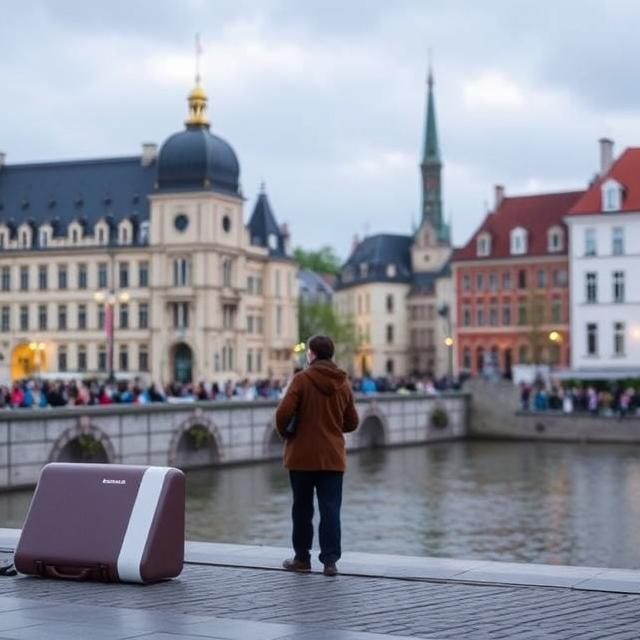Planning a round-the-world (RTW) trip on a shoestring budget can feel like a daunting challenge, but with careful planning, flexibility, and the right strategies, it’s absolutely achievable. By focusing on key areas like transportation, accommodation, budgeting, and local experiences, you can explore the world without breaking the bank. Below are the essential steps to help you plan an affordable RTW adventure.
1. Set a Realistic Budget
The first step in planning your RTW trip is establishing a budget. Be realistic about your financial limits and decide how much you’re willing to spend over the course of your journey. Keep in mind that travel costs can vary dramatically depending on where you go and how long you plan to stay.
- Breakdown Your Budget: Allocate your budget for flights, accommodation, food, activities, and transportation. For example, you may choose to spend less on accommodation in hostels or local guesthouses and save more for flights or experiences.
- Emergency Fund: Set aside a small emergency fund to cover unexpected costs like medical bills or flight changes.
- Daily Budgeting: Plan a daily expenditure limit for each region to avoid overspending. Central Europe might require a higher daily budget, while Southeast Asia or South America can be more affordable.
2. Choose Your Destinations Wisely
Not all countries are created equal when it comes to travel costs. To stick to a shoestring budget, prioritize destinations that are known for being affordable for travelers.
- Southeast Asia: Countries like Thailand, Vietnam, Cambodia, and Indonesia are affordable and offer incredible cultural experiences, beautiful beaches, and unique adventures.
- South America: Places like Peru, Colombia, and Bolivia offer rich history, stunning landscapes, and lower costs for food and lodging.
- Eastern Europe: Countries like Hungary, Poland, and Romania are much more affordable compared to Western Europe but still offer plenty of rich history and vibrant culture.
- Central America: Guatemala, Nicaragua, and Costa Rica are all affordable and offer both adventure and natural beauty.
- Avoid Expensive Destinations: While destinations like Japan, Australia, and Western Europe can be incredible, they tend to be pricier. If you need to include them in your route, plan to spend less time in those countries.
3. Plan Flexible Flights and Use RTW Tickets
Flight costs often make up a significant portion of a RTW trip budget, but you can save money by using flexible tickets or round-the-world airfares.
- Use Airline Alliances: One of the best ways to save money on flights is by booking RTW tickets through major airline alliances like Star Alliance, Oneworld, or SkyTeam. These alliances offer affordable multi-leg tickets that allow you to visit multiple continents on a single ticket.
- Be Flexible with Dates: Flights are typically cheaper on certain days of the week or during off-peak seasons. If your schedule is flexible, try to book flights during these times to cut costs.
- Budget Airlines: For short-haul flights or connections within regions, consider flying with budget airlines like Ryanair, AirAsia, or EasyJet, which offer cheaper rates compared to major carriers.
- Book in Advance: Try to book your RTW flights several months ahead to secure the best deals.
4. Save Money on Accommodation
Accommodation can quickly become one of the most expensive parts of your trip, but there are many budget-friendly alternatives to traditional hotels.
- Hostels: Stay in hostels to save money and meet other travelers. Many hostels offer dormitory-style rooms that are much cheaper than private rooms or hotels.
- Guesthouses & Homestays: In many parts of the world, local guesthouses and homestays provide affordable, comfortable accommodations while giving you a more authentic experience.
- Couchsurfing: Couchsurfing is a popular way to stay with locals for free. In exchange, you can offer a small gift or share your travel stories. It’s a great way to meet new people and save money.
- Airbnb: Airbnb is another affordable option for long-term stays. Look for private rooms or shared accommodations to keep costs low.
- Camping: If you’re traveling through areas with beautiful nature, consider camping. Many countries offer inexpensive campsites or wild camping options, particularly in places like New Zealand, the U.S., and parts of Europe.
5. Cut Transportation Costs
Transportation expenses often add up, especially when moving between different countries. Be strategic about how you get from one place to another.
- Use Trains and Buses: Instead of flying between destinations, take advantage of buses and trains. In Europe, the Eurail Pass provides unlimited train travel for a fixed price, and in South America, buses are an affordable way to travel between cities.
- Travel Overland: Opt for overland travel to reduce flight costs. This could mean taking buses, shared rides, or even hitchhiking (in regions where it’s safe) between destinations.
- Carpooling and Ridesharing: Use ridesharing apps like BlaBlaCar in Europe or Carpooling.com in other regions to share rides with locals or fellow travelers, which can be a cheaper and more sociable alternative to public transport.
6. Eat Like a Local
Food is one of the greatest pleasures of traveling, but eating out three times a day at tourist spots can eat away at your budget.
- Street Food: In many countries, street food is not only delicious but also incredibly cheap. From pho in Vietnam to tacos in Mexico, you can experience authentic flavors without spending much.
- Grocery Stores: Buying groceries and cooking your own meals is an excellent way to save money. Many hostels or guesthouses have kitchens where you can prepare simple meals.
- Local Restaurants: Avoid eating in touristy areas where prices are inflated. Instead, seek out local diners, markets, and cafes where prices are more reasonable and food is more authentic.
7. Seek Out Free and Cheap Activities
Many of the best travel experiences don’t cost anything at all, so take advantage of free or low-cost activities to stretch your budget.
- Explore Nature: Many beautiful natural sites, such as national parks, beaches, and mountains, are free to visit. Hiking, swimming, and sightseeing can all be done at little to no cost.
- Free Walking Tours: In most major cities, free walking tours are available, where you can explore landmarks and learn about the area from a local guide. While the tour is free, it’s customary to leave a tip for the guide if you enjoyed the experience.
- Museums and Cultural Sites: Look for free or discounted admission days at museums, historical sites, and cultural attractions. Many cities offer free entry to museums on certain days of the week.
- Volunteer Programs: Some organizations offer free room and board in exchange for volunteer work. This can be a great way to extend your travels while giving back to local communities.
8. Travel Slowly
One of the best ways to save money is by traveling slowly. The more time you spend in each destination, the less you’ll spend on transportation, and the more you’ll be able to immerse yourself in the culture.
- Stay Longer in One Place: Instead of rushing from city to city, spend several days or weeks in each destination. This will allow you to save on transportation costs and avoid the constant stress of moving frequently.
- Work or Study Abroad: If your trip is long-term, consider working or volunteering while you travel. Many countries offer work-travel programs (like WWOOFing or Workaway) that provide accommodation and meals in exchange for your labor.
9. Travel Insurance
While it may seem like an unnecessary expense, travel insurance can save you from significant financial loss if something goes wrong, such as a medical emergency, canceled flights, or lost baggage.
- Find Affordable Plans: Look for insurance policies that cater to long-term travelers. World Nomads and SafetyWing offer affordable coverage for travelers on a budget, including medical, trip interruption, and emergency evacuation.
- Avoid Over-Insurance: Choose a plan that suits your needs and avoid over-insuring. You can often adjust your coverage for things like adventure activities, pre-existing conditions, or theft depending on your itinerary.
10. Leverage Travel Communities
Finally, join online travel communities for tips, recommendations, and budget-friendly resources.
- Travel Blogs and Forums: Websites like Nomadic Matt, The Broke Backpacker, and forums like Reddit’s Travel section are great places to find travel hacks, advice, and low-cost accommodation options.
- Social Media: Follow budget travel accounts on Instagram or YouTube for inspiration and tips on how to travel cheap. Many of these accounts provide valuable information about affordable destinations and budgeting tips.





